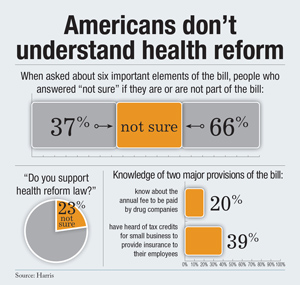 As the Supreme Court hears arguments this week regarding the Patient Protection and Affordable Care Act, it seems most Americans don't really understand what's being discussed and what's at stake.
As the Supreme Court hears arguments this week regarding the Patient Protection and Affordable Care Act, it seems most Americans don't really understand what's being discussed and what's at stake.
A new Harris poll finds most Americans don't know what is and isn't part of health reform. But the one thing they do know about—the individual mandate—they don't seem to like. More than half (51 percent) say they'd like the mandate to be repealed, while 20 percent don't want that to happen.
Overall, the public is still more or less equally split between those who support it (36 percent) and oppose it (41 percent), with many people (23 percent) still not sure.
Recommended For You
Similarly, an ABC/Washington Post poll released last week found that Americans oppose the law by 52 percent to 41 percent.
Reform 'confusing'
When asked about six important elements of the bill, large numbers of people (from 66 percent to 37 percent) aren't sure if they are or are not part of the bill, according to Harris poll.
Only modest majorities say (correctly) the following is part of the health reform bill: Not allowing insurers to deny coverage to people because they are sick (54 percent); allowing children to stay on their parents' insurance until they are 26 (55 percent); and that all employers with more than 50 employees must offer their employees affordable coverage (51 percent).
Other major provisions of the bill are not known to most people: Just 20 percent say they know about the annual fee to be paid by drug companies and 39 percent know say they've heard of tax credits for small business to provide insurance to their employees.
And even more, many also wrongly believe there are aspects of the law that simply aren't in it.
"This bill is so convoluted and is pieced out to occur over such a long timeline, that there is a considerable level of ambivalence over it," says Danielle Kunkle, a Medicare adviser at Boomer Benefits in Fort Worth, Texas. "Many people think or hope the changes won't affect them, or that they it won't matter until 2014 anyway, so they procrastinate getting their brain around it."
Many argue there hasn't been enough education on reform. Employers, too, are having a hard time complying with the law because there's just so much involved.
"It's hard for them to comply with reform because they are largely uninformed and confused about what changes they must implement," Kunkle says. Plus, she says, "there is a general consensus that all of this may change if either the Supreme Court strikes down the individual mandate or we have a change in our administration in November."
Different surveys have been coming out regarding the financial impact reform has had, or will have, on employers. Results have ranged from virtually no change to significant cost increases.
© Touchpoint Markets, All Rights Reserved. Request academic re-use from www.copyright.com. All other uses, submit a request to [email protected]. For more inforrmation visit Asset & Logo Licensing.






